It's been a quiet week ...
Not much of horticultural news of significance tends to take place at the very end of the year, so I find it’s a good time for a brief recap of what happened over the preceding 12 months. Read it with an eggnog, a hot cocoa, your morning coffee or a nightcap. Personally, having written my last newsletter of the year, I’m going to get back to building my office cabinets so I can get my collection of Ball RedBooks out of storage.
January
Costa acquires Virginia’s Battlefield Farms
In the first big horticulture deal of the new year, Costa Farms of Miami, Florida, announced the purchase of Battlefield Farms of Rapidan, Virginia. Battlefield is owned by the van Hoven family, and run by Bobby and Anthony van Hoven, two of the sons of Jerry van Hoven, who purchased the business in 1990. Bobby and Anthony and the rest of the leadership team will stay on and run the business for Costa.
Jose “Joche” Smith, CEO of Costa Farms, told me he’s had a relationship with Bobby for some years, and they’ve talked about doing a deal at various times, but the timing wasn’t right. [In late 2023,] the timing was right for both companies; they got down to brass tacks and worked out a deal. Joche said the van Hovens are “very like-minded, with a similar culture.”
Why Virginia? Territory expansion … but not too far from home. Ashville, North Carolina, is the farthest north they currently have a facility; Rapidan is just six hours further north, which he likes because it allows their regional operating units to help each other out.
In memoriam: David van Wingerden
Also in January, I was sorry to have to report the passing of David van Wingerden of Green Circle Growers and Express Seed on January 15, after a 19-month battle with acute myeloid leukemia. He was just 51. The son of John van Wingerden, founder of Green Circle, David grew up alongside his siblings in the greenhouse business, developing a love for the horticultural industry early on.
“The horticultural industry has suffered a great loss in David’s passing,” said Scott Valentine, CEO of Express Seed. “We will honor his memory and contributions by continuing to carry on his compelling passion, dedication and energy to serving the horticultural industry.”
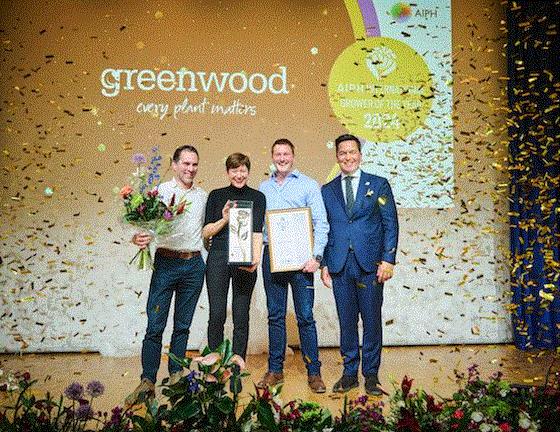
I reported on my first travels of the year—the Tropical Plant International Expo in Ft. Lauderdale and IPM Essen in Germany. There, I attended the annual International Grower of the Year Awards, where the winner of the top prize—the Gold Rose—was Greenwood Plants, a wholesale nursery from the UK. Greenwood also won the Finished Trees & Shrubs category and the Sustainability Award.

February
Glow-in-the-dark flowers get USDA OK
You’re always asking me, “What’s new?” Well, tell me if this is new enough for you: bioluminescent petunias—meaning petunias that glow in the dark. This novel introduction, which will be sold under the name Firefly Petunias, is coming from the synthetic biology startup Light Bio of Ketchum, Idaho, founded in 2019. Firefly Petunias get their glow from DNA that comes from various species of luminous mushrooms.
During the day, they look just like a regular white petunia, and require no special treatments or care. At night, they give off an “ethereal aura.” Light Bio had 50,000 plants available for purchase on their website to be shipped to all 48 contiguous states in the U.S. Price? Just $29 for a 4-in. pot.
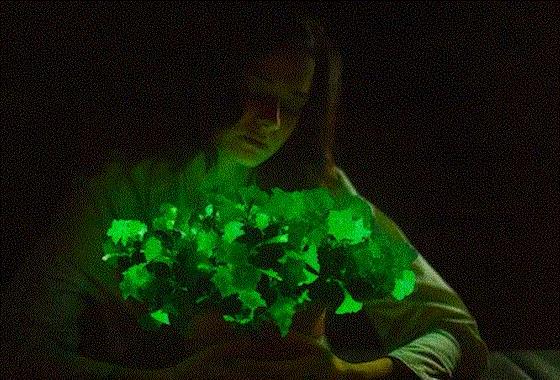
You were probably asking, “Are these things legal? And safe?”
In the eyes of the United States Department of Agriculture they are. Last September, USDA determined that Light Bio’s genetically engineered Firefly Petunia may be safely grown and bred in the United States.
“This creates an unparalleled opportunity for plant enthusiasts to enjoy the transformative experience of living light,” said Light Bio.
In memoriam: David Lemon
David Lemon, one of our industry’s most well-known and prolific flower breeders, passed away February 10 at the age of 89. Nicknamed “Marigold Man” by British gardener Christopher Lloyd, he could also be called “Pelargonium Man” or “Sweet Pea Man,” said one writer. He began his professional career in 1955, working at London’s Watkins & Simpson seed company before moving to California in 1964. Settling in Lompoc, a hotbed of flower seed breeding and production, he developed new varieties for Burpee, Denholm, Ball, Bodger, Oglevee and its successor, Ecke Ranch.
White’s to close their wholesale operation
White’s Nursery & Greenhouse—founded by one of the most venerated individuals in floriculture, Norm White, and run today by Norm and his daughter, Dana, and son, Tal—closed its doors.

Why? The same story we’ve been hearing from other growers: a capital- and labor-intensive industry, reduced customer demand, rising interest rates and a lender who no longer wants to be involved in agriculture, said Tal White. (A few months later, I had to report that they were also closing their retail operation, which they hoped to save.)
Skagit Gardens to close
I reported on two closings in the same email, this one on the opposite coast, Mount Vernon, Washington. I printed their official short-and-not-so-sweet press announcement verbatim:
Notice of closing:
Skagit Horticulture LLC will be discontinuing operations April 7, 2024. While we have managed through many challenges, current economic issues—including market pressures, production cost, energy cost, freight cost and the business climate in the State of Washington—have all contributed to this decision.

March
The Hortistician highlights the Census of Ag
Our resident hortistician Dr. Marvin N. Miller crunched the numbers on the 2022 Census of Agriculture, the once-every-five-years survey of all of U.S. agriculture that provides a quick look at our floriculture industry.
Total floriculture sales were reported as $7.473 billion in 2022 according to the Census, which contrasts to the $6.685 billion total in the Floriculture Crops Summary for the same year, 2022. The largest share of the Census pie goes to bedding/garden plants, which were $4.259 billion, or 57.0% of the floriculture total sales. Potted flowering plants accounted for 17.6% of the total sales ($1.316 billion), followed by foliage plants with 13.4% of the total sales ($999.8 million). In the Census, cut flowers and cut greens are grouped; together these accounted for 10.2 % of the pie and $763 million. Finally, there's an “Other Floriculture” category, which accounted for $135.4 million and 1.8% of the total pie.
What’s behind the changes at Dümmen Orange?
Over a three-week period, I received three press releases regarding changes to licensing agreements and partnerships between Dümmen Orange's three of their partner companies: Westhoff, Rijnplant and HilverdaFlorist. Wondering what was behind the rash of changes, I shot an email to COO Perry Wismans to see if there was more to the story. He replied, “The decision to discontinue our production license agreements with Westhoff and HilverdaFlorist aligns with our commitment to focus on selling our own breeding and other proprietary products,” he explained of the first two press releases … The timing of the transition of production and commercial activity to Rijnplant was coincidental. This decision has been under evaluation by the company for some time, and it aligns with our strategic focus on strengthening our position as a breeder.”
Also in March, I spent a week in California with Jen Zurko, Bill Calkins and Osvaldo Cuevas to cover the annual California Spring Trials—my 31st straight year covering the event. Recapping that week would take several newsletters; you can binge-watch all of our videos on your new 94-in. TV HERE.
April
Easter was great, considering how early it was
I began my annual Spring Weekend Sales Survey with Easter weekend and wrote the following:
What a great start to Spring 2024! Or at least the first weekend of April, which I consider the unofficial official start to spring, which this year happened to be Easter, which could be a blessing or a curse—a blessing because it’s a weekend many consumers like to get out and buy some flowers, either Easter flowers or garden flowers, and a curse because an early Easter could also be a cold Easter, which isn’t conducive to visiting a garden center.
Thankfully, most of you report a stellar weather weekend and the weekend score reflects that: 7.8 in the U.S. and 4.6 in Canada.
Here’s the map:
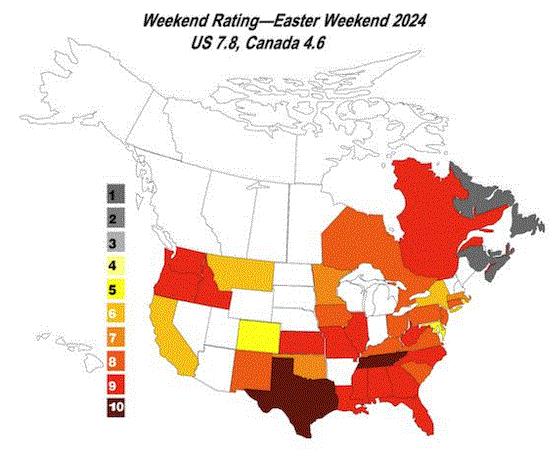
Smith Gardens Acquires Skagit’s Operations
GrowerTalks editor Jen Zurko beat me to the punch reporting this big news out of the Pacific Northwest:
Last week, Smith Gardens of Bellingham, Washington, announced that it had acquired Skagit Horticulture’s Riverbend facility operating out of Mount Vernon, Washington. The deal also includes all of the inventory that was already in production.
You may recall that in February, Skagit made the announcement that the company was discontinuing operations effective April 7. On April 8, we learned that Smith Gardens was taking over.
Eric Smith, co-owner and CEO of Smith Gardens, said the addition of what they will call “Riverbend,” will give them an additional 24 acres under cover and 20 field acres to continue to produce annuals and perennials.

May
Mother’s Day Weekend—Records fell!
This is the oddest weekend report I’ve ever written (I wrote).
The first 10 scores I received from you were 9, 9.5, 9, 10, 10, 10, 10, 10, 9 and 10. Wow!
“This is going to be the best—or one of the best—Mother’s Day reports I’ve ever given!” I thought to myself as I began populating my spreadsheet with the data.
As I tallied your scores and read your accompanying notes, I only grew more confident.
“Out of the ball park” was how John Langendoen of Willowbrook Nurseries in Ontario scored it.
“It was COVID crazy all weekend long,” said Tracy Droessler of Stockmens Greenhouse in Minnesota.
“This was about as 10/10 as it gets! Absolutely bonkers all over the PNW,” wrote Tom Van Wingerden of Van Wingerden Greenhouses in Washington. Tom added, “Most are reporting record-breaking sales this past weekend.”
And Tom was right. I counted 18 respondents out of 134 who told me they’d set new sales records at their businesses (their comments are below). I was sure this Mother’s Day would finish in the top five of all time (well, since this survey began in 2012).
So imagine my dismay to find that the national average score was just 8.3 in the U.S. and 9.1 in Canada—high scores, to be sure, but compare that to last year: 9.1 and 9.8. Or 2018’s 8.8 and 9.5.
Here’s the map:
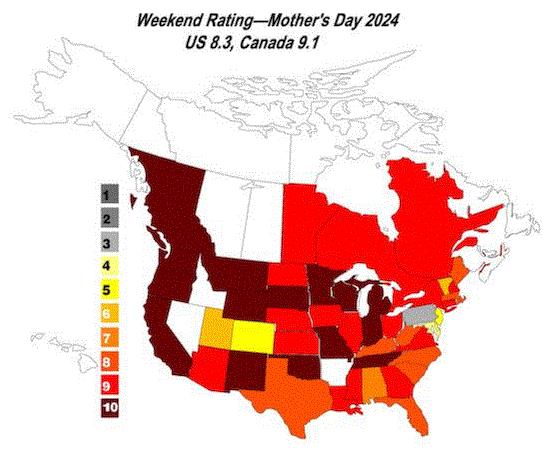
June
June 15-16: Another “meh” weekend
Maybe even a tad below meh (I wrote), if meh indicates a score of 7 as sent in by one of my regular contributors. Meh minus would be more like it, as the weekend scoring average for June 15-16 was just 6.6 in the U.S. Canada, at 7.0, hit “meh” right in the bullseye. The weekend before last was a bit better: 7.1/7.2.
Here’s the map:
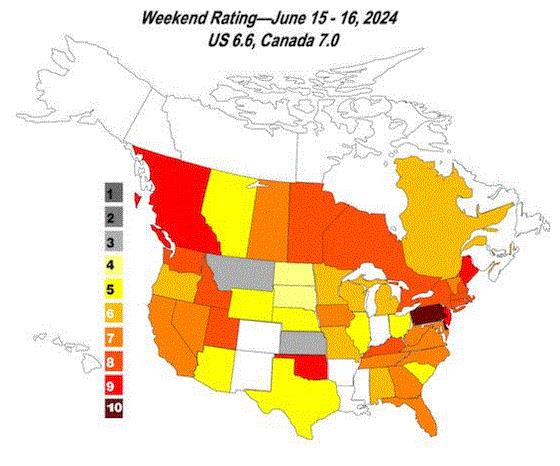
After 41 years in horticulture, I finally visit a peat bog
I’ve used truckloads of peat-based potting mix in my career, but I’ve never been to its source until now. [In May,] I made my first trip to Canada’s peat country courtesy of an invitation by Premier Tech to visit their campus in Rivière-du-Loup, about two hours northeast of Quebec. The drive through the countryside was lovely, with glimpses of the St. Lawrence River to my left, with the Notre Dame mountain range beyond that, and the city was larger than I expected, at more than 20,000 people.
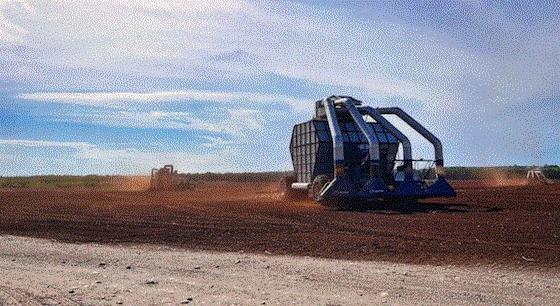
The campus is big—250 acres—with buildings old and brand new scattered across it, high-tech labs, and massive open lots of bag-and-bale storage. Because it’s in the middle of 1,900 acres of peat bog, everything has to be built on pilings driven down to bedrock.

July
How was spring? Pretty average ...
After 13 weekends of gathering your scores, including four holidays (Easter, Mother’s Day, Memorial Day and Victoria Day in Canada), I have the results and they reflect what you’ve been telling me the last couple of weeks: It was an average season at best.
The final tally? 7.1 in the U.S. and 7.4 in Canada.
Here’s the map: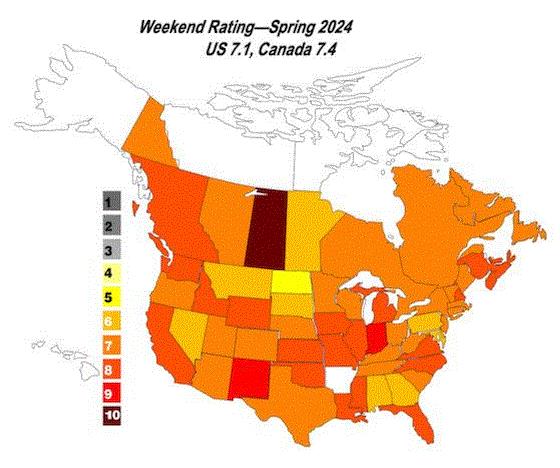
Your gut scores
How did you rate your entire season and how do those “gut” scores compare to the real scores? Historically, you tend to remember the season more optimistically than your week-to-week scores reflect and 2024 is no exception: You rated it 7.4 in the U.S. and 7.8 in Canada—just slightly better than it actually was (7.1/7.4). Based on my recollections, this is closer than usual—sometimes you’re a full point higher.
A River Ridge Recap
Gardening in River Ridge was down by 13 homes, to 205 out of 356, or 57.5%. Last year, 218 of my neighbors gardened, or 61%. Look at the historic chart and you’ll see that’s the second-lowest level of gardening in 10 years; indeed, it’s the second-lowest since 2005, when this thing officially launched. That’s bad … but it’s not the biggest single-year decline I’ve seen, which is somewhat heartening. The chart shows a 6-point drop from 2015 and 2016; there was also a 5.5-point drop from 2007 to 2008 (from 68.5% to 63%).
August
Congrats, Paul Pilon!
We think of him as the editor-at-large of our wildly popular Perennial Pulse e-newsletter and columnist for GrowerTalks. But, of course, Paul Pilon has a day job as Director of Growing at Opel Growers in Hudsonville, Michigan. And he’s been a respected perennial crops consultant, too. Now he can add to his list of achievements the Perennial Outreach and Education Award from the Perennial Plant Association. Paul was presented with the honor during the PPA’s 2024 National Symposium in Asheville, North Carolina.
“This award recognizes an individual or organization who has distinguished themselves by advancing perennial plants and the industry through education, advocacy, awareness, outreach or promotion,” said the press release.
In memoriam: Flower Time’s Bob Ench
There are a few long-defunct businesses that made a big impact while they were here. One of those is Flower Time, the Long Island retail garden center founded by Bob Ench. Bob passed away on July 17 at the age of 83. Born and raised in Brooklyn, Bob graduated from Farmingdale State College on Long Island in 1960, and started Flower Time shortly after, eventually growing it to the 38 stores. He even took Flower Time public! In the ’80s, Flower Time merged with the rapidly expanding Frank’s Nursery & Crafts (which had just been acquired by General Host Corporation). For a time, Bob served as the 250-store chain’s chairman. In 1988, Bob started Hopewell Nursery in Bridgeton, New Jersey, with the plan to build a first-class golf course with specialty trees and plants being highlighted on each hole. When the market shifted, so did Bob, and Hopewell Nursery was formed. In 2020, Central Garden & Pet acquired Hopewell to go along with their Bell Nursery acquisition in 2018.

September
Watching computers grow tomatoes
In September, I told you about the Autonomous Greenhouse Challenge taking place at WUR—Wageningen University and Research in the Netherlands. The Autonomous Greenhouse Challenge pits five teams of scientists and experts against each other, growing a crop of tomatoes in greenhouse cells at WUR. The goal is to produce as much fruit as possible with the lowest input costs—energy, fertilizer, water, etc. Just like real growing! Except in this case, the scientists won’t grow the crop, their algorithm will, making every decision about temperate, light, humidity, feed and water, etc. The teams can only sit back and watch their software at work, hoping they got it right. In the meantime, for comparison and control, a human team (“Reference”) is growing a crop the old-fashioned way. January 16 is when the winner will be announced.
Könst gets new owners
Könst Alstroemeria, a well-known Dutch breeder and supplier of alstroemeria and zantedeschia (calla lily) plants, announced its acquisition last week by four horticultural industry entrepreneurs: current CEO Paco van der Louw, Geert Burger, Jelle Posthumus* and Martin Buter. They bought the business from flower breeder Hans Könst, founder of the company.
Dutch cut flower sector “hugely under pressure”
When I got the press release above, I asked my Dutch friend and magazine colleague, Ron van der Ploeg, editor of FloraCulture International, if he had any more information about the reason behind the sale. He did not; he could only speculate, so I will leave that question unanswered until I can reach Mr. Könst or one of the new owners.
But Ron did say the Dutch cut flower segment “is hugely under pressure.”
“Yeah? How so?” I asked. He sent me this list in reply:
- Energy costs
- Societal pressures (“Do we really need flowers if they are only decorative?”)
- Lack of labor
- Lack of a succession plan or successors to take over the business
- European red tape
- Competition from low-cost countries with more favorable climates
“The same old story,” Ron said. “Except for the societal pressures because that’s pretty new. But,” he added, “my opinion does not count; what growers tell you does.”
Also in September, I reported on two more notable passings: Dr. Stanton Gill of the University of Maryland and Peter Orum, founder of Midwest Groundcovers and a major horticultural philanthropist.
October
11,000 acres of greenhouse damaged by hailstorm
I picked up this weather-related news from my friends at HortiDaily, who reported on the loss of 4,500 hectares (11,000 acres) of greenhouses near the town of El Ejido, Spain, located within the province of Almeria, Spain, AKA the “Sea of Plastic,” so called because there are 86,000 acres (125 square miles) of poly greenhouses there producing fruits and vegetables for Europe. It’s so big you can see it from space (well, you can’t, but astronauts can).
Firefly Petunia makes cover of Time
Albert Einstein. Mahatma Gandhi. Winston Churchill. Mother Teresa. And now Firefly Petunia.
Yes, strange bedfellows, but they all share one trait: They’ve all been on the cover of Time magazine.

We know why the other dignitaries did. As for Firefly it was named to Time’s List of the Best Inventions of 2024, joining 199 other innovations “changing how we live.” Time doesn't claim these innovations will save lives or anything—the list includes a motorized camera tripod, a serum for smoothing split ends, an app for proposing marriage (developed in Ukraine, where getting together in person to do it can be challenging these days) and an AI-powered toilet seat. But they are cool, and Firefly, a bioluminescent petunia that glows in the dark courtesy of some mushroom genes, is definitely cool!

November
Inside Grower, Indoor Ag-Con partner to launch CEA awards
Inside Grower magazine, one of our three Ball Publishing periodicals, has partnered with Indoor Ag-Con to present a brand new slate of awards at the upcoming Indoor Ag-Con show at the Westgate Las Vegas, March 11-12, 2025.
The awards, cleverly called the CEAs (the Cultivating Excellence Awards), came out of a need and desire to recognize the ground-breaking growing operations in the controlled-environment agriculture industry—those that are innovative and sustainable. To that end, there are two grower-focused awards, the Operational Excellence Award and the Good Stewardship Award. There's also a third industry award—the Product Innovation Award—to honor those new products that address the evolving needs of CEA growers.
Vertical farm Bowery closes
Bowery, based in New Jersey, just announced it’s laying off 187 workers and closing its operations. The company, founded in 2015, quickly excited investors, raising $700 million in venture capital, including from some high-profile investors like Google Ventures, Justin Timberlake, F1 driver Lewis Hamilton, and chefs Jose Andres and Tom Colicchio. The startup was once valued at $2.3 billion! They'd also attracted Whole Foods, Albertsons and Amazon Fresh as customers.
So what went wrong? No official word yet, but Agriculture Dive reports “rising costs and a lack of venture capital funds.”
Really? (I quipped) Not “it’s impossible to pay back $700 million selling lettuce”?
December
My cub reporters cover the Plantpeddler Poinsettia Trial
I reported (with the help of Dr. Chris Curry and some of his Iowa State students) on the poinsettia trial at Plantpeddler, where they offered several awards. The favorite red from the trial might be called a “novelty red”: Sky Fantasy from Selecta One, which has white “stars” on its red bracts. The favorite novelty was Giulia from Lazzeri.
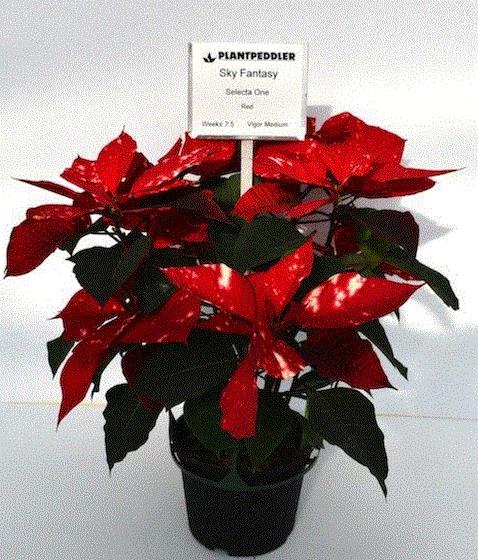
“Mmmmmmm. I’ll have the Mocha Mousse, please!”
Or perhaps not. Never have I seen a Pantone Color of the Year generate such universal disgust among designers and plant people. We can work with a lot of colors, but this one seems … well, here are some comments from Facebook attached to Pantone’s update of their profile picture to the color:
“1980s pantyhose. Cool.”
“If disappointment was a color.”
“All the millions of beautiful colors in the world and Pantone picks this.”
“Oh yeah, spray tan.”
“It’s only been an hour, Pantone. You can delete this and try again.”
“Reminds me of wet patè liver-flavored cat food.”
“If ugh was a color.”
“The ’80s called … they want their couch back.”
“Band-Aid.”
“Silly Putty.”
“If Vienna sausages were a paint color.”
And quite a few poop emojis.

To be fair, there are some fans:
“This neutral girl loves it!!!”
“It’s actually a gorgeous color.”
“But for real, I am in love with this color and how it conveys warmth, classic style and calm. I love the earthy tone and how it pairs well with so many colors.”
“Very earthy chic.”
“Love this color! Mix it with a green-tone turquoise, pearl, Roman glass hues, various jaspers. You can do a lot with mocha brown.”
“I love it. They don’t all have to be some bright obnoxious garish color.”
“This is right up my street. It’s cozy nights in with a hot chocolate and marshmallows and all things #hygge.”

Finally …
So that’s that: 2024 in a nutshell. Do you have any special memories or milestones from the year you’d like to remember? Or would prefer to forget? Share them HERE. Just in case January starts out slow.
Somehow, though, I don’t think it will …
Feel free to email me at beytes@growertalks.com if you have ideas, comments or questions.
Happy New Year!

Chris Beytes
Editor-in-Chief
GrowerTalks and Green Profit
This e-mail received by 29,672 loyal readers!
Thanks to my loyal sponsors, who help me reach the 29,672 readers of Acres Online in more than 60 countries. Want to be one of them (a sponsor, that is)? Give Kim Brown a shout and she will tell you about our many advertising opportunities.